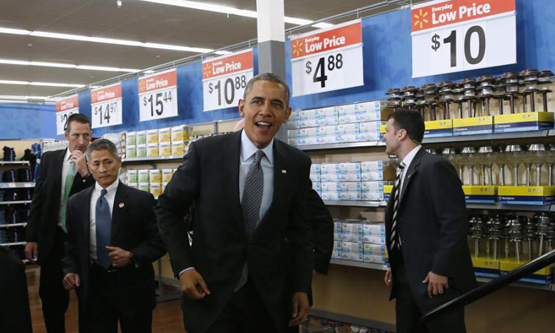Fight Racism! Fight Imperialism! 239 June/July 2014

According to official census statistics, in 2012, the official US poverty rate was 15 per cent, with some 46.5 million people living in poverty. Most of the adults counted in these figures are ‘working poor’ – employed, but paid a very low wage. Official inflation figures do not represent real changes in the cost of living, and the cost of living index has been manipulated for political reasons. Independent statisticians calculate that the real inflation rate is about three percentage points higher than the official rate. It is therefore no surprise that low-paid workers are fighting back. Our US correspondent STEVE PALMER reports.
Restaurants and food preparation are major employers of low-paid workers: almost half of the Americans who earned the federal minimum wage of $7.25 [£4.25] or less per hour last year worked in food service. Chains like McDonald’s and Burger King not only pay their workers the minimum possible wage, but also try to avoid paying any benefits such as healthcare. Since November 2012, fast-food workers backed by the Service Employees International Union have organized various protests in front of McDonald’s and other chains such as Kentucky Fried Chicken in more than 100 cities across the US. On 21 and 22 May, protests were held in more than 150 US cities and 30 other countries worldwide in support of increased pay, better conditions and the right to organize. 110 workers and activists were arrested outside McDonald’s world headquarters just outside Chicago and forced it to shut down for the day. The following day, protests were held outside McDonald’s annual shareholders’ meeting.
Fast-food workers are not the only low-paid workers fighting back. With 2.2 million workers – sorry, ‘associates’ – Walmart (Asda in Britain) is the largest private employer in the world and the largest overall employer in the US and in 25 states of the Union. In 2013, its revenue of $476.3bn, was about the same as the GDP of Argentina, the 26th largest economy in the world. Nearly one-third of the US population visits a Walmart store every week. The average pay of a Walmart worker is $8.81/hr or just $15,500 a year, while the US national average is $22.33 per hour – $46,440 a year. Because it pays so poorly, Walmart employees have to make up their pay with $1bn in government benefits, subsidies and allowances. ‘Flexible hours’ plans adjust employees’ presence at the stores to optimize profits – at the expense of workers’ rest and of their ability to attend other jobs that many have to hold down in order to make ends meet. This pays well: the Walton family – six people – which owns the retail giant has a combined wealth equal to that of the bottom 42 per cent of the US population.
Walmart is consciously anti-union – it gives managers special anti-union training, and organized labour has been battling to find a way to fight the retail giant. In October 2012, for the first time, workers at multiple stores staged a one-day work stoppage to protest against retaliation at their efforts to organize. The strike was prepared by a year of organizing by OUR Walmart, an organization of Walmart employees. These protests have since escalated with workers staging a variety of protests, including pickets, strikes, marches and flash mobs inside the stores. Walmart controls one of the largest and most elaborate supply chains in the world, yet manages to keep it legally distant, subcontracting warehousing and other activities to exploitative companies who keep workers on temporary contracts for years. However, these workers too have begun to fight back and stage strikes disrupting the Walmart supply chain for weeks.
When Barack Obama was a candidate for President he said ‘I don’t mind standing up for workers and letting Walmart know they need to pay a decent wage and let folks organize.’ Yet on 9 May, visiting California on one of his regular fundraisers, Obama became the first sitting President ever to visit a Walmart store while in office, giving a speech on energy efficiency in the Walmart at Mountain View, and without saying a word about decent wages and the right to organize. Workers and their supporters protested this outrageous breach of elementary solidarity. Michelle Obama attended a Walmart business roundtable in March and has cheerfully embraced Walmart in her campaign against childhood obesity since 2011, appearing at Walmart stores and with Walmart executives at business functions.
This cosiness with Walmart has brought a barrage of criticism from struggling workers and unions who see this blatant collaboration with the class enemy as a betrayal. Obama’s verbal support for increases in the minimum wage results in only the very lamest of practical advances: while workers and activists are generally campaigning for an increase from $7.25/hr to $15/hr, Obama has proposed an increase to $10.10/hr, spread over three years. Even this was blocked by Republicans in the Senate at the end of April ensuring that there is no legislative remedy coming any time soon. However, in response to the workers’ struggle some states and cities have passed their own minimum wage legislation, including an increase to $15/hr in Seattle. Clearly it is the struggle in the streets, not legislative horse-trading, which will enable workers to reach their goal.




